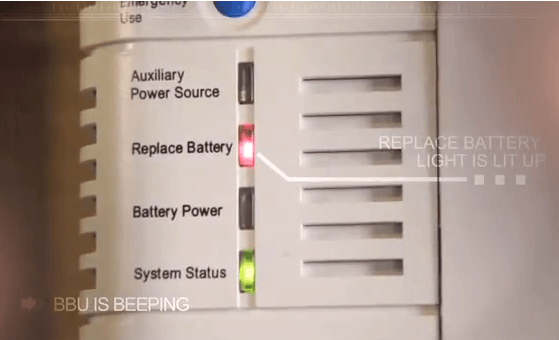
Verizon says customers are responsible for maintaining and replacing backup batteries used with its FiOS service.
Beep. Beep. Beep.
Verizon FiOS phone customers will one day hear that ominous sound in their home and begin searching for the source. The audible alarm isn’t coming from the smoke detector or your computer’s uninterruptible power supply. It is coming from a square white box mounted in your garage or basement with a Verizon logo on it.
The Verizon Optical Network Terminal (ONT) Battery Backup Unit (BBU) provides up to eight hours of backup power for your FiOS voice services in the event of a commercial power failure.
Verizon considers its battery your problem, even though you lease the equipment from Verizon as part of your monthly service. After one year of standard warranty coverage, customers are responsible for maintaining the battery and for any damages that might occur if one fails to replace or remove it. Verizon’s website warns not promptly removing the spent battery could result in leaking corrosive battery acid which might damage the BBU itself. You would be held responsible for any repair or replacement costs.
Some Verizon FiOS customers cannot understand why they should pay to maintain equipment Verizon still technically owns.
“They require us to lease the equipment (set-top boxes, wireless router, backup battery device, etc.) so they are responsible,” believes one disgruntled customer. “If they would sell it to us or allow us to provide our own I could see us paying for it.”
Verizon representatives say they fully disclose customers are responsible for maintaining the battery. But customers complain it is buried in the fine print. Many more are unhappy to learn Verizon charges at least $45 for a replacement battery that seems to last only about two years.
 Joanne Gaugler is on her third battery in seven years, and that one is now on its way out.
Joanne Gaugler is on her third battery in seven years, and that one is now on its way out.
“The battery I have now has been beeping for a long time,” Gaugler wrote.
Not only does the battery beep incessantly, but the company also begins sending e-mail messages warning customers they need to replace it to avoid the possibility of damaging their equipment.
“When I called about this problem ten months into my FiOS service, the representative had me remove and reinstall the battery, claiming it was probably a loose connection and that I did not need a new battery,” says Stop the Cap! reader Jim Connor. “When I called back about the same problem 13 months into my FiOS service — one month out of warranty — the representative insisted I buy a new battery.”
Connor said Verizon charges an exorbitant amount for the replacement.
“Another profit center for Verizon, because they charge $35 for the battery and another $9 to ship it, before taxes,” Connor writes. “I ended up paying $10 less at a local battery replacement store, but Verizon got all bothered I did not buy it from them, warning it could ‘damage my service.'”
Verizon strongly discourages customers from buying replacement batteries from anyone other than themselves and disclaims any responsibility for damages caused by “an improper battery.” Verizon also offers customers free battery replacement if you happen to buy a Verizon Protection Pak plan, which starts at $19.99 a month.
There is nothing special about Verizon’s backup battery, a standard issue 12-Volt 7.2Ah SLA (Sealed Lead Acid) model often found in home alarm systems. Frugal Verizon FiOS customers can find equivalent batteries online for less than half the price Verizon charges, often with no upfront sales tax or shipping.
A Stop the Cap! search for “GS Portalac PX12072” or “GT12080-HG” (from labels on current batteries) on websites like Amazon or eBay quickly uncovered several highly rated alternatives that cost as little as $18 with identical specifications.
Batteries of this type have a shelf life of 3-5 years, and an in-service useful life of 1.5-3 years, after which they should be replaced and recycled.
Another alternative is to simply remove the battery altogether. That will result in no backup landline service in the event of a power failure, but your cell phone may already offer a suitable alternative.
[flv width=”640″ height=”380″]http://www.phillipdampier.com/video/KDKA Pittsburgh Verizon FiOS Battery 5-09-13.mp4[/flv]
KDKA in Pittsburgh reports around 10 Verizon FiOS customers a day are flooding into local Batteries Plus stores looking for new batteries for the company’s equipment. (4 minutes)
[flv width=”640″ height=”380″]http://www.phillipdampier.com/video/Verizon Install Replacement Battery 2012.flv[/flv]
Now that you have a replacement battery in hand, here is a Verizon-produced video explaining how to safely install it. (4 minutes)


 Subscribe
Subscribe
Normally, I don’t side with a “cable company”, but Verizon shouldn’t have to replace batteries in the modem anymore than they should be on the hook to replace the AA batteries in the remote control that you lease from them. What Verizon shouldn’t be doing is insisting that batteries be purchased from them. That’s what makes it look like a nefarious plan for revenue generation. One of the solutions it to take out the dead battery and go without battery back-up. Or you could always plug it into a UPS that you should have in your home already. Of course,… Read more »
You are wrong. You would be correct if I WANTED a battery. But I don’t. I have a cell phone. I have disconnected my battery and the unit is still beeping. Now I am FORCED to buy a battery I DON’T WANT just to stop the noise. The woman I spoke to said I HAVE to have a battery. I have no choice. I said “Oh but I do. I can cancel Verizon and switch to another company.” Which is what I am going to do tomorrow.
Disclaimer: This is an operation which may damage your device if you’re not careful! To disable the beeping alarm (which is powered by the mains, not the battery) you need to unscrew the cover of the FIOS BBU, get into the guts of it and either destroy or put some gum over the piezo transducer, which is a circuit board mounted speaker. It looks like about a 10mm black disc with a little cut out in the center. Block the cutout to damp the noise, or cut the piezo off and you will get reduced/no more beep. You can still… Read more »
verizon should stop the damn beeping all the time
our battery is good and it still beeps for no reason at all
that stupid green button does not reset anything
tired of buying new batteries to replace good batteries because of verizons
design intended to sell us more batteries at high prices that we dont need
While I agree that this is a money grab, there is one crucial point to this issue I feel you missed.Although most your information was correct, Here are some key pieces of information Verizon customers deserve to know. It is absolutely not true that you need this battery. IT DOES NOT EFFECT THE TV OR INTERNET. The only reason its there is to keep the phone service on during a power outage, simulating a true land line (For up to 8 hours). As you mentioned in the article, when the battery dies it beeps loudly, demanding for more cash, however,… Read more »
We have a beeping battery on our FiOS system. Called FiOS and they said I can disconnect the battery and leave it out. Furthermore on new installations FiOS now gives customers the option of having a battery installed or not. It’s the customer’s choice. My solution to my problem is that I will remove the battery and not put it back in. No more beeping. And kudos to FiOS for not continuing to put batteries in their systems when some people don’t want or need them.